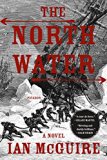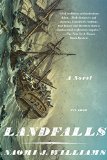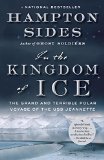Summary | Excerpt | Reviews | Beyond the book | Read-Alikes | Genres & Themes | Author Bio

A Novel
by Ian McGuireIn early 1859 the crew of the Volunteer, a Greenland-bound whaler, is making the most of the last few days ashore at Hull, England, before setting out to sea. Some, like Henry Drax, spend the time boozing and whoring, while Patrick Sumner, an Irish surgeon and veteran of military service in India, needs to gather supplies for his role as the ship's doctor. As he stocks up on medicines and laudanum to feed his own opium addiction, Sumner receives an ominous warning: The captain of the Volunteer, Arthur Brownlee, has a bad track record, a beggar tells Sumner. Three years ago Captain Brownlee's ship Percival hit an iceberg and sank; all its whale oil plus 18 men were lost.
Despite that inauspicious precedent, the journey starts off well. In April the ship makes its first stop at Lerwick in the Shetland Islands to pick up more crew members. During another island landfall, the sailors club seals to death for valuable skins. Later they capture a polar bear cub they intend to sell to a zoo for a tidy sum. And at last, in June, they get their first whale. The next day they kill two more, and the boat is such a hive of grisly industry that even Sumner has to help butcher and store the whales. McGuire describes the result with gruesome thoroughness, piling up archaic adjectives in a clever recreation of Victorian prose: "The men, empurpled, reeking, drenched in the fish's steaming, expectorated gore."
Although the quest is succeeding financially, the crew's relationships are starting to break down. Sumner responds with alarm when Joseph Hannah, a thirteen-year-old ship's boy, comes to him with injuries and venereal disease that indicate he has been violently sodomized. The doctor goes to the captain with his findings but the case is quickly dismissed; Hannah won't accuse anyone. At this point Sumner reports feeling himself "surrounded by savages, by moral baboons." Before long, Hannah is found dead in a water cask, with evidence of strangulation and further sexual assault.
In the ensuing investigation, McGuire introduces a tantalizing touch of dramatic irony: readers soon know whodunit but the characters do not, so to start with it looks like the wrong man will be arrested and the real killer might go free. After an act of mutiny and a poor decision to keep sailing too late into the season – leaving the ship vulnerable to icebergs – the remaining crewmen are left stranded in the frozen North. Dependent on the kindness of "Eskimo" traders and an English missionary, they continue to hunt and kill for their survival as they wait for another ship to rescue them.
Much of the novel is bleak and brutal. There are a lot of 'F' and 'C' words, yet this novel is so impeccably researched that I don't doubt the language is accurate. McGuire never shies away from the gory details of life, whether that's putrid smells, bodily fluids, animal slaughter, or human cruelty. And yet he uses such effusive, vivid vocabulary that he somehow renders these shocking scenes artful, as when writing of a corpse: "All that is left is a grotesque and bloody gallimaufry of bones, sinew, and innards." Still, readers who are squeamish or easily upset should beware.
The bulk of the book is from Sumner's perspective, and flashbacks to his time in India show that even good guys sometimes make moral compromises. On the flip side, I thought that the novel's villain was perhaps too evil, with no redeeming features at all. Still, this is a powerful inquiry into human nature and the making of ethical choices in extreme circumstances. From the open seas to the forbidding polar regions, this is an adventure worth taking.
![]() This review was originally published in The BookBrowse Review in May 2016, and has been updated for the
April 2017 edition.
Click here to go to this issue.
This review was originally published in The BookBrowse Review in May 2016, and has been updated for the
April 2017 edition.
Click here to go to this issue.

If you liked The North Water, try these:

by Naomi J. Williams
Published 2016
By turns elegiac, profound, and comic, Landfalls reinvents the maritime adventure novel for the twenty-first century.

by Hampton Sides
Published 2015
New York Times bestselling author Hampton Sides returns with a white-knuckle tale of polar exploration and survival in the Gilded Age. Winner of the 2014 BookBrowse Award for Nonfiction.
Your guide toexceptional books
BookBrowse seeks out and recommends the best in contemporary fiction and nonfiction—books that not only engage and entertain but also deepen our understanding of ourselves and the world around us.